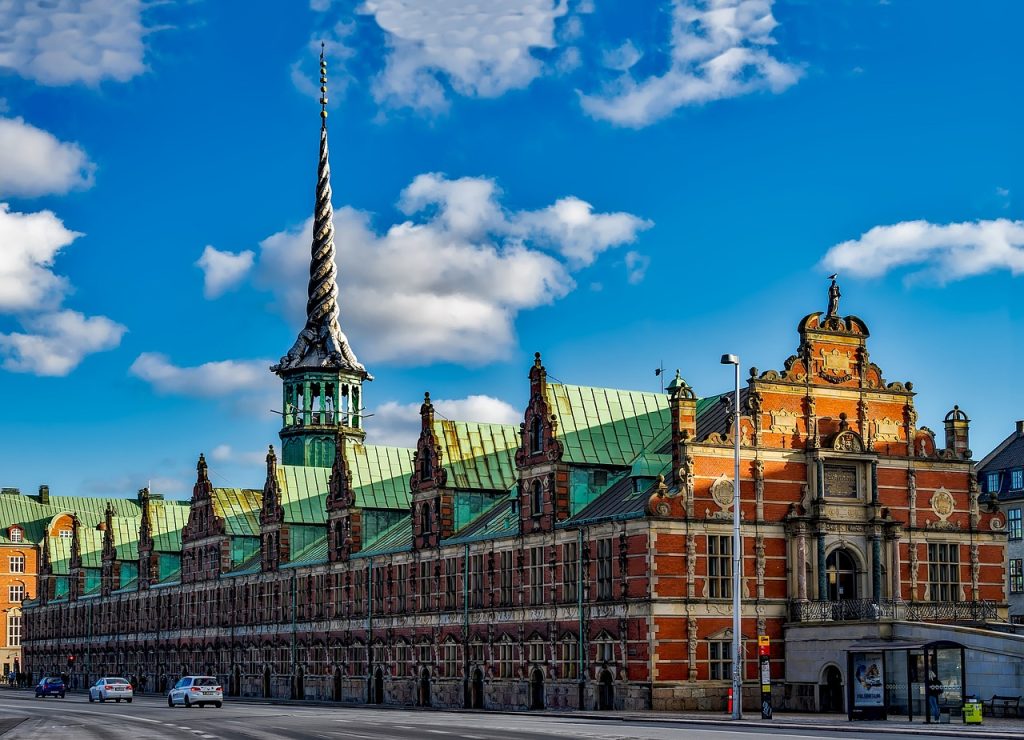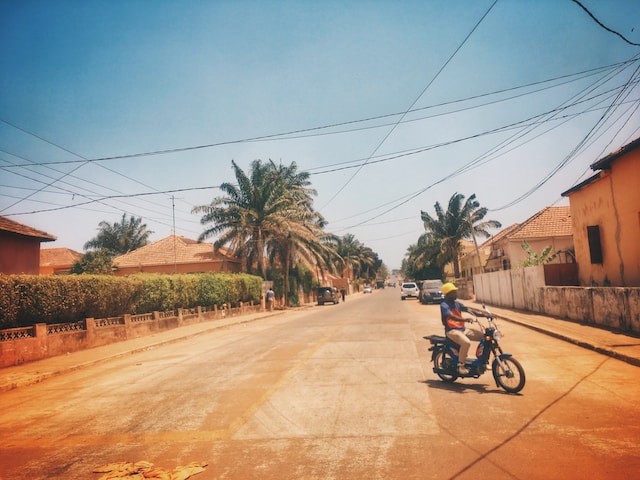Location
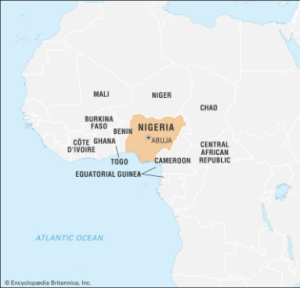
Nigeria is a West-African country located on the west-African coastline. Its geography is diverse that stretches from arid to humid equatorial climates. However, the country’s most diverse feature is the people living in the country. Nigeria has hundreds of ethnic dialects, including Yoruba, Hausa, Ibibio, Igbo, and English. The country’s official language is English, although the language is less frequently used by people who are less educated and those in rural areas.
Size and population
The most dominating ethnic group is the Hausa, who comprise 25 percent of the total population; the Yoruba form about 21 percent, and the Igbo form about 18 percent. In 2020, Nigeria’s population had over 206 million people, all under an area of 356,669 square kilometers. Nigeria’s coast covers approximately 530 miles. Its capital is Abuja. It was created by decree in 1976. It lies in the central part of the country. Abuja is roughly 300 miles northeast of Nigeria’s former capital, Lagos. Lagos has so far retained its stance as Nigeria’s leading industrial and commercial city. Nigeria’s currency is the naira. About 415 Nigerian Naira makes 1 United States dollar. The country has several International airports, including the Murtala Muhammed International Airport, the biggest airport in the country. It has about 27 airlines with about 43 destinations. Other international airports include the Nnamdi Azikiwe International Airport and the Port Harcourt International Airport. The country is a federal state officially known as the Federal Republic of Nigeria. The border countries of Nigeria are Niger to the north, Benin on its western side, and to the east, it is bordered by Chad and Cameroon.
Language
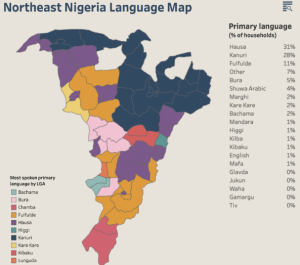
Nigeria has approximately 510 existing ethnic languages with more than 250 ethnic groups. 9 Nigerian ethnic languages have gone extinct, and two languages tend not to have native speakers. The official language used in the country is English. It serves as the medium of instruction as it is used in business, business, and for other official purposes. The major ethnic dialects are Hausa, Igbo, Yoruba Eifk, Ibibio, and the Annang language. Nigerian language
diversity is an African model that encompasses the three main African families: the Niger-Congo A, Nilo-Saharan, and the Afro-Asiatic.
Nigerian official language, English, is spoken by a small group of people in urban areas.
About 75 percent of the country’s total population lives in rural areas. Therefore, the dominant dialects are the country’s ethnic languages, such as Yoruba and Hausa. The most recognized dialect in Nigeria is the Chadic language, Hausa. Approximate more than 24 million people speak the language in West Africa. It is also the second language of more than 15 million others. The language is associated with the Muslim culture in Nigeria since it is usually spoken by the Muslims of the country. The current standard Yoruba language was established via the efforts and works of Samuel Crowther, who was the first African bishop of the Anglican Church.
Nigerian communication styles vary due to their diverse ethnic make-up. A handshake is the most common greeting style, which is always warm and accompanied by a welcoming smile. The greeting is always by the right hand, and a man will tend to place his left arm on the opponent’s shoulder while shaking hands. Close friends and relatives will often hug when meeting, although those following the Muslim culture, who make up 50 percent of the Nigerian people, will shake hands when greeting the opposite sex.
Climate
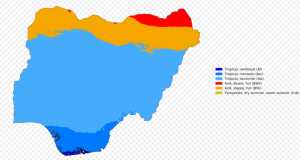
The weather in Nigeria is typically tropical, but the wet and dry seasons can shift depending on where you are in the country. In the southeast, the weather is typically hot and humid, while in the southwest and further inland, it is typically dry. The climate in the north and west is characterized by distinct wet and dry seasons, whereas the climate in the extreme north is characterized by minimal annual precipitation and more of a steppe-like appearance.
In general, the length of the rainy season shortens as one travels further northward from the equator. The rainy season in the south lasts from March all the way through November, while in the extreme north it only lasts from mid-May all the way through September. There is a discernible break in the rainy season in the southern region during the month of August, which results in a brief dry season that is commonly referred to as the “August break.” The southwest receives approximately 1,800 mm of rainfall annually, whereas the southeast experiences over 3,000 mm of rainwater on an annual basis. This is in comparison to the northeast, which gets overt 3,000 mm of rainfall annually. The farther inland one travels from the shore, the less rain one can expect to see in a given year; the far north gets only 500 mm.
In the south, temperatures and humidity levels stay generally stable throughout the year, whereas in the north, these factors fluctuate significantly according to the four distinct seasons; during the northern dry season, the everyday temperatural range is also significantly larger.
History

Nigeria is known for its numerous empires and cultures compared to the rest of the African countries. Its history is traced to as early as 11,000 BC when some ancient African communities inhabited the land that makes up current Nigeria. Nok civilization thrived in Northern Nigeria from 500 BC to 200 AD (Afigbo, 2005). The Nok and other civilizations in the country made life-sized terracotta sculptures that are popular figures in Sub-Saharan Africa. Kano and Katsina cities have some of the country’s history that dates back to 999 AD (Afigbo, 2005). Benin Empire was the popular empire in the land that ruled before the British arrived. Benin’s rule was known as Oba of Benin. On the Eastern side of the country, the Nri Kingdom inhabited it in the 10th century. Muslims arrived in the country in the 11th century through the Hausa States. The Portuguese and the Spanish explorers came to contact with the Nigerian coast in the 16th century and started to trade directly with the local people in Calabar, and the port, which they later named Lagos. In 1911, the Igbo people of the Nri Kingdom lost their power to the British colonialists. Some Kingdoms like the Oyo and Yoruba Kingdoms attained prominence in the country. During the 19th century, the Fulani Empire was established by Usman dan Fodio. He successfully led a jihad. It was also known as the Sokoto Caliphate. The Fulani Empire over the current central and northern Nigeria. Its sovereignty lasted until 1903 when the Europeans broke the empire to form several European colonies.
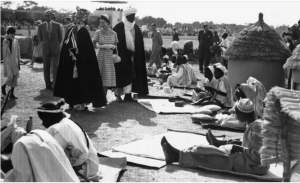
The British forces seized the country’s capital, Lagos, in the 1850s and officially annexed it in 1861. The British took the Nigerian land and made it its protectorate. They colonized Nigerians until 1960, when Nigeria gained its independence. Nigeria became a republic in 1963.
In 1966, there was a coup d’état, and the country fell under military rule (Afigbo, 2005). The Republic of Biafra was created in 1967, which led to a conflict that lasted for three years and resulted in a civil war. In 1979, a new constitution was drafted, and Nigeria became a republic again. However, Major General Muhammadu Buhari stopped the republic governance with his military for four years. The major was later overthrown, and in August 1993, the country formed a new republic. In the same year, the republic was dissolved in November by General Sani Abacha. In 1998, the general passed on. In 1999, following the general’s death, a fourth republic was formed.
After Nigeria formed a democratic government in 1999, Olusegun Obasanjo was elected as the country’s president. In 2003, Olusegun was re-elected again as the president. General elections were held in 2007, and Umaru Yar’Adua was elected president under the People’s Democratic Party (PDP). In May 2010, Umary passed on, and Dr. Goodluck Jonathan. In 2011, general elections were held, and Dr. Goodluck Jonathan won the elections replacing Umaru.
Muhammadu Buhari won the 2015 general elections and defeated President Dr. Jonathan Goodluck. Muhammadu Buhari has remained in the presidency seat till today.


